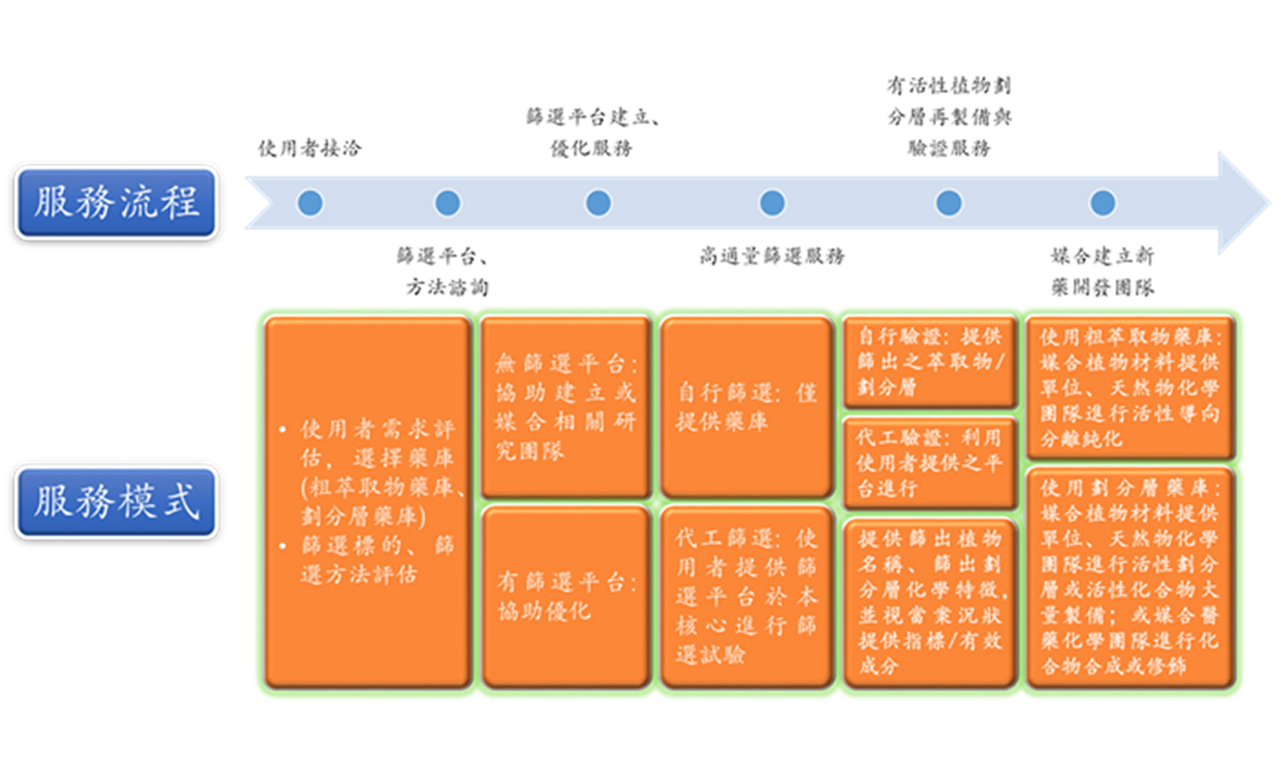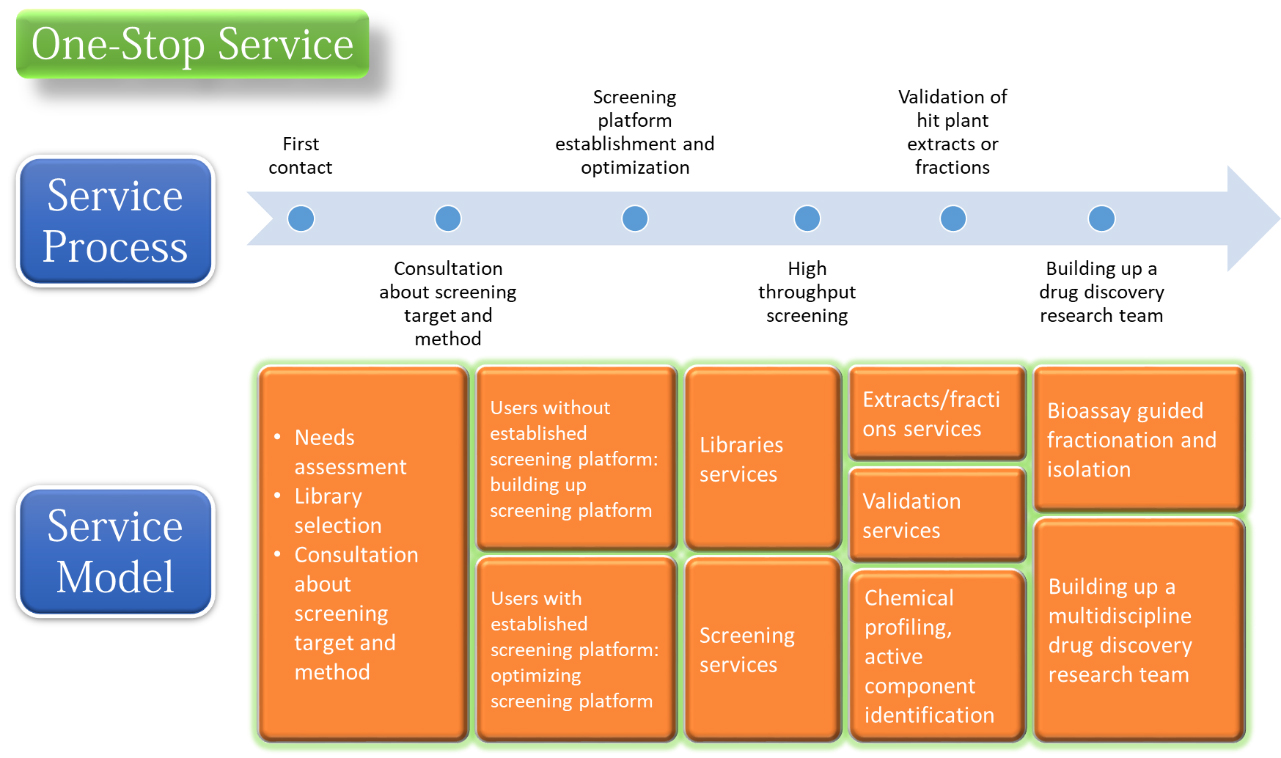新藥開發的寶庫-巨量植物萃取物藥庫的製備與高速篩選
新藥開發的寶庫-巨量植物萃取物藥庫的製備與高速篩選
天然藥物開發之困境與契機
一直以來,天然物就是藥物開發的重要來源。但隨著高通量技術的發展,新藥開發轉向了以組合化學為來源的小分子化學合成藥庫。但是過去的實務經驗中也發現:組合化學所製造的小分子化合物藥庫配合高通量篩選的策略,在先導藥物開發的成功率似乎仍無法正比於藥廠所投入的開發資源。許多大型篩選的結果令人失望,研究者也理解了「與生物活性相關的化學空間 (chemical space)多樣性」比化學藥庫的大小(化合物數量)更為重要。分析2001-2019年FDA所通過的新藥物會發現,純化學合成的小分子新藥比率為24.6%;相對的,天然物、天然物衍生物或是藥效基團(pharmacophore)的結構是來自或是源自於天然物的合成小分子藥物等等與天然物相關新藥,再加上植物新藥,全部的比率約占49%。這個結果也顯示天然物仍然是新藥開發中無法取代的資源。而其中一個決定性的因素就是天然物具有多樣化的藥效基團與高複雜度的立體化學。但是天然物的純化需要耗費大量的人力與時間,純化後所得到的化合物,大多也難以應付建構藥庫以及後續驗證實驗所需,因此由天然純化合物所構成的藥庫相當少見,且這些藥庫通常化合物種類都僅在數百種上下。且由於天然物的高複雜度立體化學特性,也大大降低天然物合成的產率,並大大提高合成步驟與困難度。這些因素都讓天然物新藥開發難以應用高通量篩選的模式進行。為了在化學多樣性、藥庫大小、藥庫製備的各種成本之間取得一個平衡點,折衷的觀念因應而生,研究者開始使用劃分層提取物(fractions)進行高通量篩選。將粗萃取物進一步分成數十個至上百個劃分層,由於小量製備便已足夠用於藥庫建置,從而使得規模小型化並且提高製備速度。這些藥庫也相當適合使用高通量篩選進行生物活性測試。而這樣的藥庫配合上靈敏的核磁共振技術能夠解決化合物分離和結構解析的瓶頸問題。
關於本核心平台主要目標:
- 提供多樣化且穩定之天然物藥庫及高通量篩選服務,發展成為一個優質的天然物新藥開發平台,為產、學界在生技醫藥領域挹注研發量能,促進台灣生物醫學領域與醫藥產業的發展。
- 服務模式:本計畫之核心設施服務模式之規畫為整合高雄醫學大學校內現有之天然物資源與高通量篩選儀器設備,提供一站式服飾,包含使用者需求的評估、篩選標的與方法的諮詢、篩選平台的建立與優化、高通量篩選與驗證服務、活性劃分層的化學特徵及指標/有效成分的鑑定、相關研發團隊的媒合。依據使用者的需求,提出固定或客製化的服務模式。
- 服務能量:本資源平台目前提供3個天然物萃取物藥庫。第一個為台灣本土植物萃取物庫,目前有3,000個甲醇萃取物。第二個為辜嚴倬雲植物保種中心-辜成允植物藥庫,目前有2,889個萃取物。第三個為劃分層藥庫,目前總共有6,240個劃分層。儀器設備方面,本校已經建構有半自動化高通量篩選平台設施,包含:自動化液體工作站、自動化多功能微量盤式分析儀、高內含影像系統。我們的篩選速度大約為每天2,000~4,000個藥物/萃取物。我們能接受各種常見的篩選方法,我們的平台能偵測可見光吸收值、螢光、冷光強度值以及以螢光影像為基礎所建立之篩選方法。過去幾年我們協助使用者發現了豬籠草科與芭蕉科家族植物具有對抗B型肝炎病毒、流行性感冒病毒、以及抗癌的生物活性,已有部分成果發表,相關的專利以及後續研究目前仍正在進行中。

本校主要研究者之簡介:
核心設施負責人:天然藥物研究所顏嘉宏副教授,主要負責藥庫建置、高通量/高內涵篩選服務與推廣之相關工作。
天然物化學研發團隊:高雄醫學大學在天然物的研究領域已有悠久歷史與成果。本核心的協力研發團隊有藥學系張訓碩教授以及天然藥物研究所張芳榮教授、鄭源斌教授(現轉任職於中山大學海洋生物科技暨資源學系,此部份工作為鄭教授於高醫天然所期間所完成)。
植物樣品提供單位:辜嚴倬雲植物保種中心,執行長為清華大學生科院李家維教授。
本核心設施網址: https://nps.kmu.edu.tw/
研究聯繫Email: chyen@kmu.edu.tw
Natural Product Libraries and High-Throughput Screening Core (NPS Core)
Natural Product Libraries and High-Throughput Screening Core (NPS Core)
The difficulty and opportunity of drug discovery from natural products
Natural products have always been an important source of drug development. However, with the development of HTS technology, synthetic small molecule compound libraries which are built based on combinatorial chemistry are the main focus of drug discovery. Combinatorial chemistry can quickly provide a large number of small molecule compounds. However, the results of many large screens have been disappointing in practice. It was recognized that combinatorial chemistry techniques may not able to fulfill the expectation that could provide all the chemicals needed for successful lead discovery. Researchers have also realized that “chemical diversity” is more important than the size of libraries (number of compounds). Analysis of the new approved therapeutic agents by US FDA from 2001 to 2019 revealed that 24.6% are synthetic drugs; by contrast,49% are natural products, natural derivatives, synthetic compounds derived from natural product pharmacophores, or botanic drugs (mixture of natural compounds). One of the decisive factors is that natural product collections exhibit a wide range of pharmacophores and a high degree of stereochemistry. This indicated that natural products are still an irreplaceable resource for drug discovery. However, it is a time- and labor-consuming work to isolate pure compounds from natural materials; and usually only limited variety and quantities of pure compounds are obtained. In addition, the high stereo-chemical diversity properties of natural products also hugely increase the difficulties in synthesis of natural products. Thus, pure compound library of natural product is not commonly available. These factors make it difficult to apply HTS approaches for drug discovery from natural product. In order to strike a balance between chemical diversity, drug library size, and various costs of drug library preparation, researchers have begun to use pre-fractioned library for HTS. A crude extract is divided into tens to hundreds of fractions. Small quantities of crude extracts are enough for the preparation of library with large number of fractions for biological tests. Furthermore, the bottleneck of the isolation and structure-elucidation of active component in fractions can also be addressed by sensitive NMR techniques.
About NPS Core lab
- Goal: Providing diversified and stable natural product libraries and high-throughput screening services; and becoming a high-quality platform to help natural product drug discovery research of academic and industrial fields.
- Our service: This platform integrates the existing natural product resources and high-throughput screening equipment in KMU. Our service starts with a consultation with users on the ultimate goal, target and assay methods of screening, establishment and optimization of screening assay, high-throughput screening, hits verification, chemical characterization of active fractions, and identification of indicators/active ingredients. We will bridge user and our supporting laboratories to build a drug discovery research team. According to users demand, customized services is can be integrated with our standardized models.
- Our capacity: We offer three natural product libraries. The first one is the Taiwan indigenous plant extract library, which contains extracted 3,000 extracts. The second library is Dr. Cecilia Koo Botanic Conservation Center (KBCC)-library, which contains 2,889 extracts. The third library is pre-fractioned library, which contains 6,240 fractions. We equipped with an automatic liquid handling workstation, an automatic multimode plate reader, and a high-content system. Our screening capacity is around 2,000~4,000 tests/day. Absorbance, fluorescence, luminance, or image based assays are all applicable on our platform.

Main researcher Intro.
PI of NPS Core: Chia-Hung Yen, (Associate Professor, Graduate Institute of Natural Products) who responsible for the management, construction and maintenance of natural product libraries and high-throughput/high content screening services.
Natural product chemistry teams: KMU has long and rich experience on natural product research. Thus, we have strong supported labs led by Prof. Hsun-Shuo Chang at School of Pharmacy, and Prof. Fang-Rong Chang and Prof. Yuan-Bin Cheng at Graduate Institute of Natural Products. (Prof. Yuan-Bin Cheng currently teaches at Department of Marine Biotechnology and Resources, National Sun Yat-Sen University. Extracts preparation for libraries construction was carried out by Prof Cheng's lab in KMU)
Plant material supporting team: Dr. Cecilia Koo Botanic Conservation Center of which Prof. Chia-Wei Li at Institute of Molecular and Cellular Biology, National Tsing Hua University is the CEO.
Website of NPS Core: https://nps.kmu.edu.tw/
E-mail address of CH Yen: chyen@kmu.edu.tw


